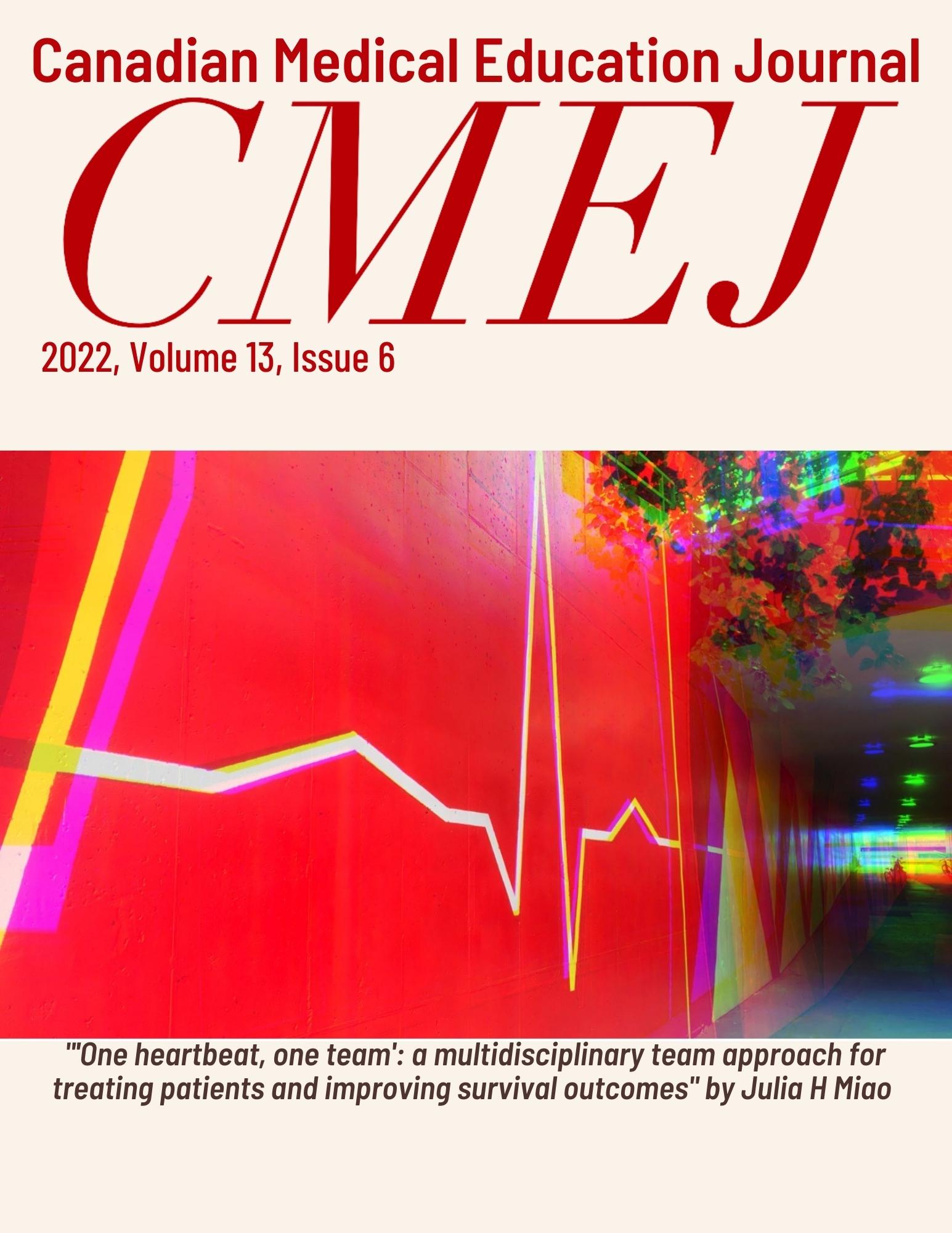Exploring resident perspectives on family medicine enhanced skills training
DOI:
https://doi.org/10.36834/cmej.72657Abstract
Background: Third-year enhanced skills programs, also known as family medicine (FM) PGY3 programs, have always been an area of debate. Their exponential growth does not stem from a strong body of academic evidence or public health needs assessment. This qualitative descriptive study explores the current perspectives of second-year FM residents at the University of Ottawa on extended training programs through semi-structured interviews.
Results: Of the fifteen participants, eight were applying to PGY3 FM programs, six were not and one was unsure. Themes generated included: developing generalist niches within primary care, increasing confidence of FM graduates, allowing generalists to fill in healthcare gaps to meet community needs, meeting the pressures of workplace competition and employability requirements, and creating alternate paths to five-year specialties. 80% would extend their core FM training, with self-design and options of shorter time frames as preconditions.
Conclusion: FM residents are interested in furthering their training, whether through extending core residency period or via enhanced skills programs. The demand for these programs will continue rising. Capitalizing on residents’ interests to catapult the profession forward and optimize the quality of healthcare should be the priority for licensing bodies and medical educators.
Downloads
References
Green M, Birtwhistle R, MacDonald K, Schmelzle J. Resident and program director perspectives on third-year family medicine programs. Can Fam Physician. 2009;55(9).
Busing N. Survey of third-year postgraduate training positions in family medicine. Can Fam Physician. 1992;38(June):1393–6.
Chaytors RG, Spooner GR, Moores DG, Woodhead-Lyons SC. Postgraduate training positions: follow-up survey of third-year residents in family medicine. Can Fam Physician. 1999;45(JAN.):88–91.
Dhillon P. Shifting into third gear: Current options and controversies in third-year postgraduate family medicine programs in Canada. Can Fam Physician. 2013;59(9):406–12.
College of Family Physicians of Canada. College of Family Physicians of Canada Member Interest Groups Section [Internet]. 2020. Available from: https://www.cfpc.ca/CFPC/media/PDF/MIGS-Strategic-Plan-Final.pdf [Accessed Nov 17, 2021].
Slade S, Ross S, Lawrence K, Archibald D, Palacios Mackay M, Oandasan IF. Extended family medicine training. Can Fam Physician. 2016;62(December 2016):749–57.
Oandasan IF, Saucier D, (eds). Triple C competency-based curriculum report – Part 2: advancing implementation. Mississauga, Ontario; 2013. Available from: www.cfpc.ca/uploadedFiles/Education/_PDFs/TripleC_Report_pt2.pdf.
Shaw E, Oandasan I, Fowler N. CanMeds-FM 2017: A competency framework for family physicians across the continuum. Mississauga, Ontario; 2017. Available from: http://www.cfpc.ca/uploadedFiles/Resources/Resource_Items/Health_Professionals/CanMEDS-Family-Medicine-2017-ENG.pdf
Hyejin K, Sefcik JS, Bradway C. Characteristics of qualitative descriptive studies: a systematic review. Res nurs health. 40.1 (2017): 23-42. https://doi.org/10.1002/nur.21768
Lacey Α, Luff D. Qualitative Data Analysis. Trent Focus Research Dev Prim Heal Care. 2001
Kennedy TJT, Lingard LA. Making sense of grounded theory in medical education. Med Educ [Internet].2006;40(2):101–8. https://doi.org/10.1111/j.1365-2929.2005.02378.x
Green M, Birtwhistle R, MacDonald K, Kane J, Schmelzle J. Practice patterns of graduates of 2- and 3-year family medicine programs: In Ontario, 1996 to 2004. Can Fam Physician. 2009;55(9).
Llyod S, Streiner D, Shannon S. Family medicine residency programs: evaluating the need for different third year programs. Can Fam Physician. 1994;10(February):273–8.
The College of Family Physicians of Canada. Canadian Medical Association. National Physician Survey 2013. Results for Family Physicians. The Royal College of Physicians and Surgeons of Canada. 2013 Available from: https://www.hhr-rhs.ca/fr/outils/bibliotheque/english-french/national-physician-survey.html [Accessed on Nov 17, 2021].
Busing N. Survey of third-year postgraduate training positions in family medicine. Can Fam Physician. 1992;38(June):1393–6.
Winter RO. How long does it take to become a competent family physician? J Am Board Fam Pract. 2004;17(5):391–3. https://doi.org/10.3122/jabfm.17.5.391
Lemire F, Fowler N. Pursuing longer family medicine training. Can Fam Physician. 2021; 67(218)
Downloads
Published
How to Cite
Issue
Section
License
Copyright (c) 2019 Elise Azzi, Edward Seale, Douglas Archibald

This work is licensed under a Creative Commons Attribution-NonCommercial-NoDerivatives 4.0 International License.
Submission of an original manuscript to the Canadian Medical Education Journal will be taken to mean that it represents original work not previously published, that it is not being considered elsewhere for publication. If accepted for publication, it will be published online and it will not be published elsewhere in the same form, for commercial purposes, in any language, without the consent of the publisher.
Authors who publish in the Canadian Medical Education Journal agree to release their articles under the Creative Commons Attribution-Noncommercial-No Derivative Works 4.0 Canada Licence. This licence allows anyone to copy and distribute the article for non-commercial purposes provided that appropriate attribution is given. For details of the rights an author grants users of their work, please see the licence summary and the full licence.











